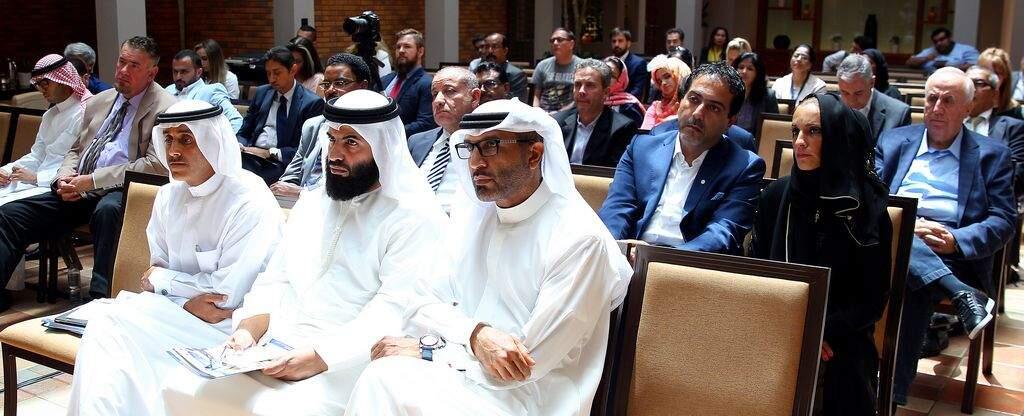By 2020, 100 schools in Dubai could become solar schools. As a result, 200,000 families will be contributing towards the Dubai Clean Energy Plan 2050.
On Monday, an initiative by dubai-solar.org called ‘Dubai Solar Schools’ was announced. It will be rolled-out over the next three years.The main aim of the initiative is to involve the Dubai education sector in the Dewa ‘Shams Dubai’ regulation – with 100 schools and universities to be targeted.
Calling on all Eco-warriorsAs an active partner of the Dubai Solar Schools initiative and in order to spread knowledge of the new generations towards the benefits of renewable energy, the Shaikh Mohammed bin Rashid Centre for Cultural Understanding (SMCCU) will launch a unique cultural competition among all Dubai schools.’Dubai Vision – creating the future capital of solar energy’ was announced by Abdallah Al Serkal, Director and Founder of SMCCU on Monday.
During the competition, students will be required to creatively imagine the future Dubai as a solar city by taking inspiration from the past forms of renewable energy.It will take place during the academic year 2016-2017, and in June 2017 three winners will be announced – with each being rewarded a monetary prize.All the details will be officially released during a press conference at the Dewa Dubai Solar Show 2016 – Part of Wetex (October 4-6, 2016).From that date schools will be able to enroll form the SMCCU website and start working on their projects.’Shams Dubai’ supports the vision of Shaikh Mohammed bin Rashid Al Maktoum, Vice President and Prime Minister of the UAE and Ruler of Dubai, in diversifying the energy mix by promoting the use of clean and renewable energy sources to build a sustainable future for the Emirate.Speaking to Khaleej Times, David Provenzani, Managing Director of dubai-solar.org, said each of the education facilities could host an average of about 500kW of power – totalling to 50mW across all facilities.
Typically, to install solar panels producing this amount of energy would usually require an investment of approximately Dh2.5 million from the building’s owner.But what this initiative will offer is an incentive.Those who want to be part of the project will require zero capital of investment as certified companies (a third party) will offer them an attractive “solar lease formula”.This lease formula will see the third party investor charge the education facility a monthly lease fee, “which works out to be about 10 per cent less of the school’s existing Dewa bill”, Provenzani said
.Key outcomes:
1. Reduce schools energy bills by installing rooftop solar energy panels upon a ‘solar lease formula’ (zero capital to be invested from the school)
2. Support school’s educational programs by using the same solar energy plants in the role of study-subject and operative laboratories
3. Showcase the solar projects of schools on occasion of official events such as the Dewa Dubai Solar Show.NOTE: From start to finish (including application process) installation of panels can take up to 6 monthsAs a result, the school will obtain 100 per cent clean and carbon-free electricity during the next 20 years.”After seven to nine years, these schools and universities could reduce their energy bills dramatically – in some cases to zero,” Provenzani added.
At present, 10 education facilities (hosting 19,000 students) across the city have joined the initiative (see box).A further 50 schools and universities have undergone a preliminary analysis to gauge whether they are eligible for solar installation.The Dubai Clean Energy Plan 2050 aims to provide 75 per cent of the Emirate’s nergy from solar by 2050 (25 per cent by 2030), making Dubai the world’s cleanest city.Reactions from educators on ‘Solar Schools Dubai’James Wheeler, (Chief Operating Officer, Taaleem)The offer to become ‘Solar Schools’, is an attractive proposition on so many levels and we welcome this new initiative to help schools become more involved.
Taaleem’s schools are constantly striving to reduce their carbon footprint. In addition to environmental awareness events and after school clubs, the schools have active programmes to reduce electricity and cooling usage during off peak times as well as promote re-usable water bottles instead of plastic disposable bottles.Ashok Kumar (Chief Executive Officer, Indian High School)Moving towards sustainability is the need of the hour and we’re fortunate to be living in the UAE that is steadfastly moving in that direction.
‘Solar Schools’ is a brilliant concept and a testament of the vision of the UAE’s leadership. We aim to be a LEED certified school by 2018.The Indian High School is in the process of expansion and will use solar panels on the roof tops of the new blocks in a move towards sustainability.At present, The Indian High School is the proud recipient of the DEWA Conservation Award, 2014 for reducing the consumption of water and electricity.H. David Shaw,(Executive Director – Enrollment Management, American University in the Emirates)”Dubai Solar Schools is definitely something we can invest in.
We recently visited Education City in Qatar and 90 per cent of its electricity is generated through solar and wind energy – about 70 per cent of which is gained through solar power. It is a great investment.For this initiative though, I think they need to work on the curriculum end a bit more.
As in how the investment can been beneficial to the students, how can they be more involved etc.”Monica Valrani, (Chief Executive Officer, Ladybird Nursery Dubai)”I think this is a great initiative. Moving forward, this is the direction the world is going in. We just received out LEED Gold Certification which is very difficult to achieve.
An initial investment of around Dh2.5 million for solar panels does not surprise me because the return on investment is huge after several years – and it’s an investment in the environment too. At Ladybird Nursery we already use solar water heaters. 25 per cent of our construction materials is recycled content and we have light sensors too among other things.”
Source: MenaFn











